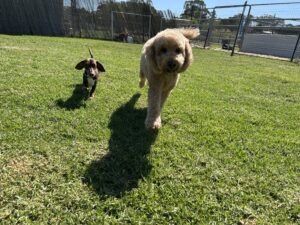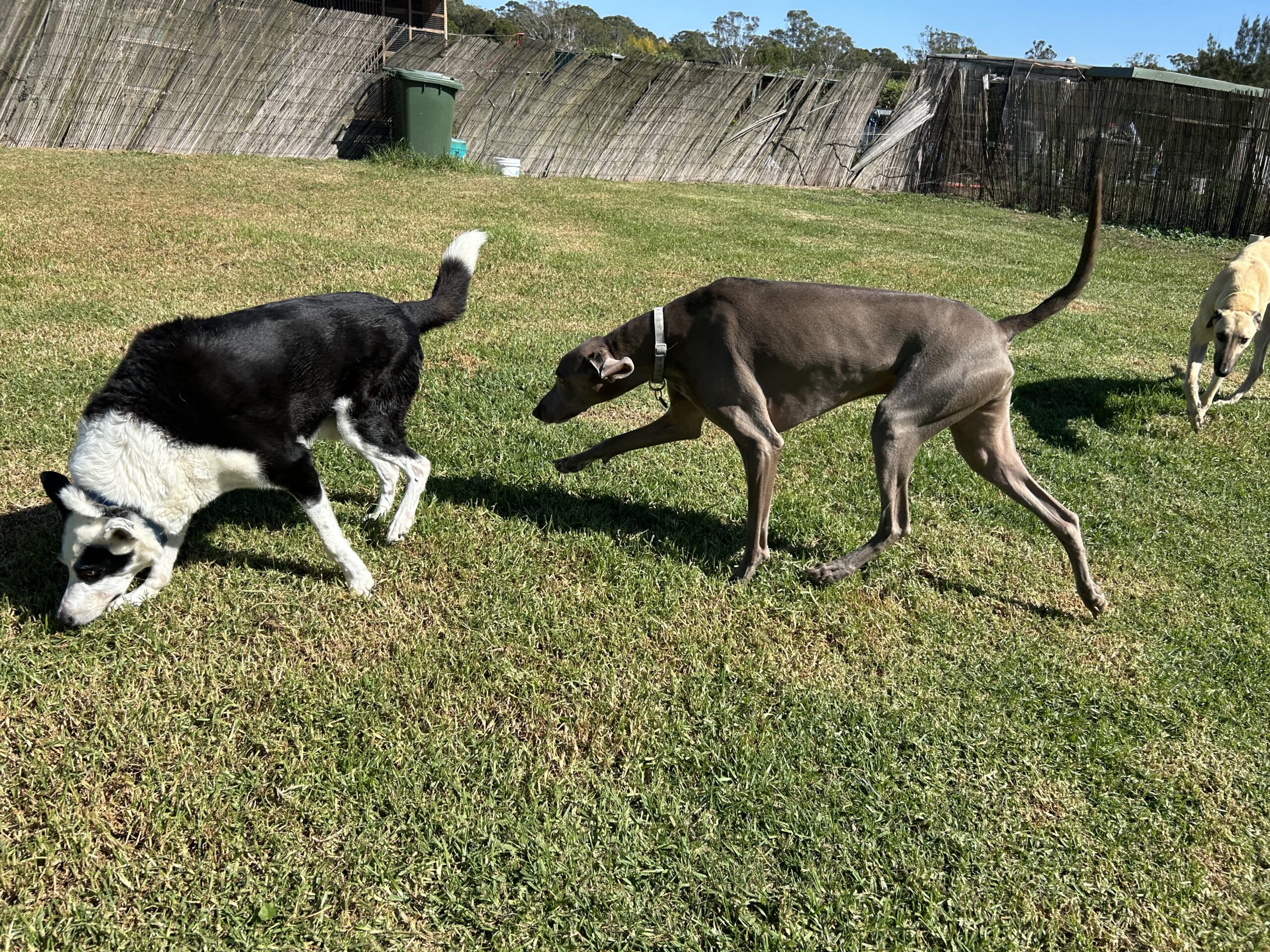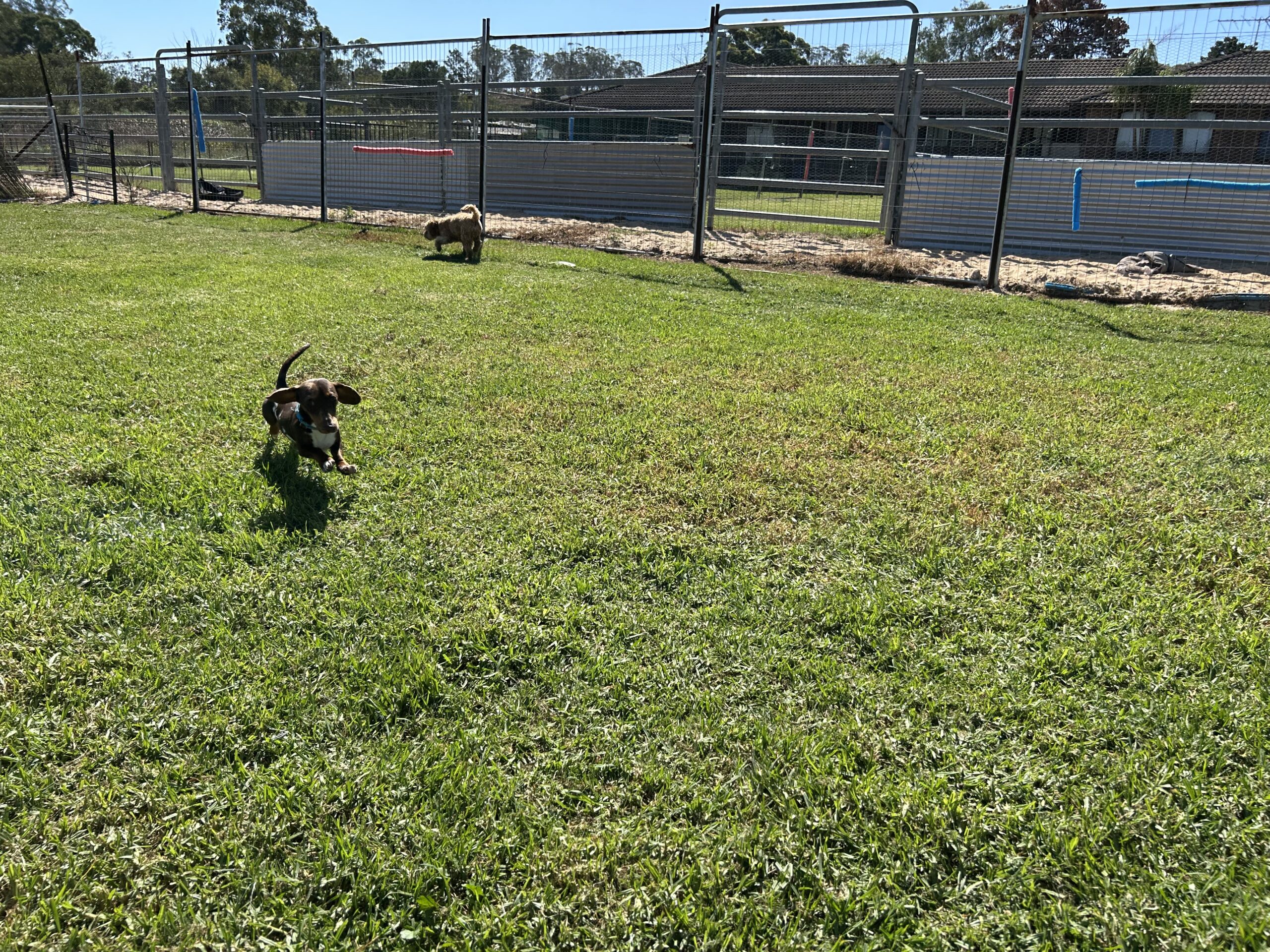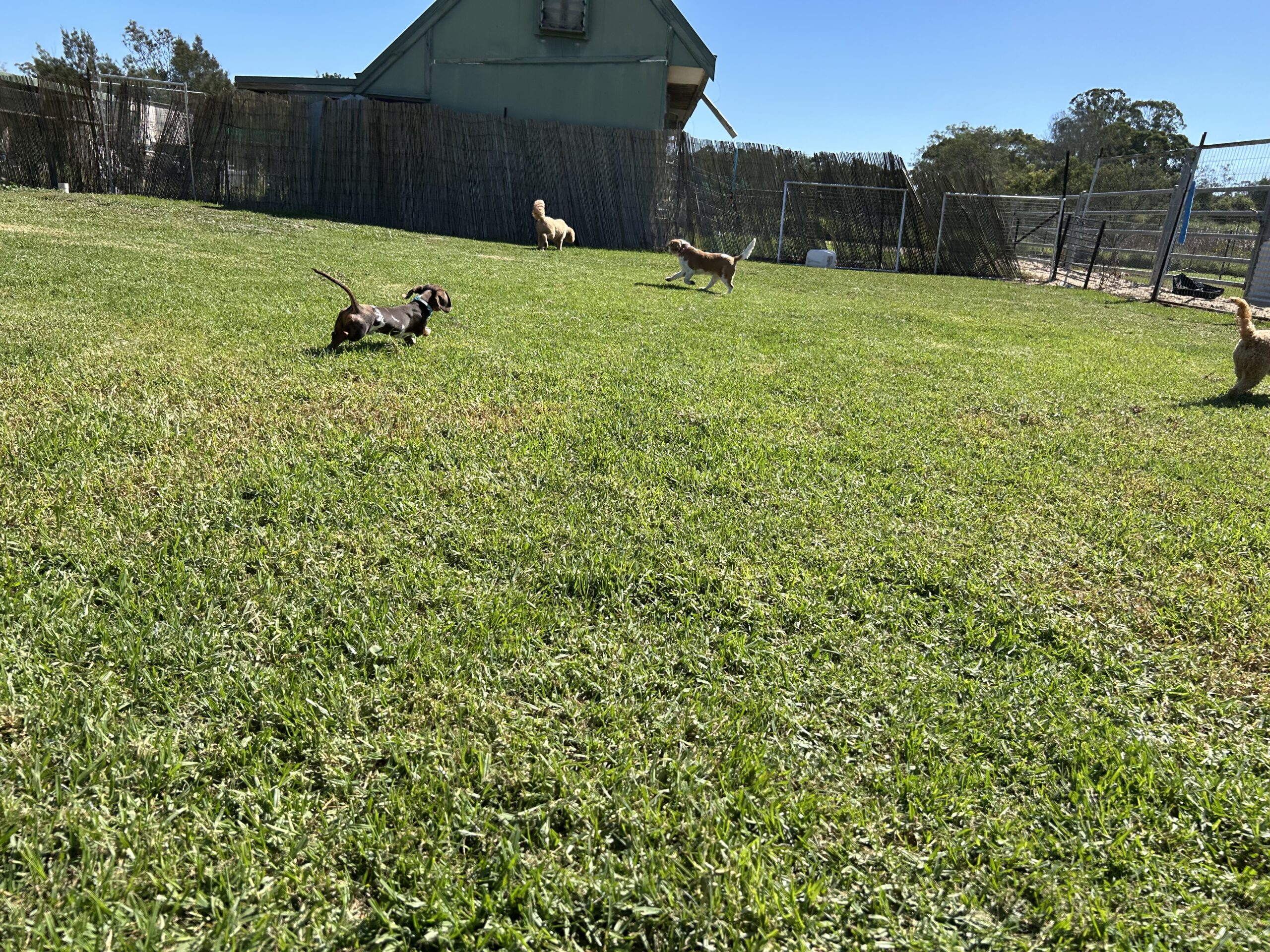Improved Leash Behaviour: Joyful Walks Through Strategic Daycare Training
Improved leash behaviour through quality daycare programs creates polite, relaxed walking companions through systematic desensitization, impulse control development, and real-world skill application.
Key Takeaways: Enhancing Public Manners Through Daycare
Essential Public Behaviour Benefits
Why It Matters 
Improved leash behaviour starts with general impulse control
- Self-regulation skills transfer directly to walking scenarios
Daycare develops frustration tolerance applicable to walks
- Dogs learn to manage excitement even with stimulating triggers
Social exposure creates resilience to public distractions
- Dogs become desensitized to novel people and other animals
Daycare public manners training uses real-world scenarios
- Skills develop in authentic environments, not sterile training settings
Consistent handling protocols create handler-neutral responses
- Manners function with any handler, not just the primary owner
♀️ Group movement activities directly parallel walking skills
- Following direction in groups builds leash walking responsiveness
Fulfilled social needs reduce reactive leash behaviours
- Socially satisfied dogs have less frustration during on-leash encounters
Individual assessment identifies specific walking challenges
- Targeted intervention addresses exact issues affecting each dog
“The Public Embarrassment: Is Your Dog’s Leash Behaviour Making Walks a Source of Stress?”
Has the simple act of walking your dog transformed from an anticipated pleasure to a dreaded ordeal? Perhaps your canine companion lunges at passing dogs, pulls relentlessly toward every intriguing scent, or displays embarrassing overexcitement when encountering strangers. Many devoted owners eventually limit or even abandon public outings altogether, missing a core bonding activity while their dogs lose valuable environmental enrichment.
Research from veterinary behavioural science reveals that problematic leash behaviour represents one of the most common yet addressable frustrations affecting dog owners. Even more concerning, a comprehensive survey conducted by the Australian Companion Animal Council found that 64% of owners reported significant stress during walks, with 42% ultimately reducing walking frequency due to unmanageable behaviour—creating a detrimental cycle affecting both human and canine wellbeing.
The consequences extend beyond simple frustration to fundamental welfare concerns. According to certified professional dog trainers, dogs with limited public access due to poor leash manners typically experience reduced environmental enrichment, fewer social opportunities, and increased household tension. The good news? Quality daycare public manners programs can systematically develop the social skills, impulse control, and environmental resilience that create polite public behaviour.
Daycare Public Manners Training Through Systematic Skill Development
Improved leash behaviour facilities operate on a fundamental behavioural principle: polite public conduct requires development of underlying self-regulation abilities rather than simple obedience. Unlike basic command training, quality daycare public manners programs implement sophisticated developmental protocols designed by canine behaviour specialists.
“Most owners fundamentally misunderstand leash reactivity and pulling,” explains Dr. Emma Richardson, veterinary behaviourist. “These issues typically stem not from disobedience but from underdeveloped impulse control, excessive arousal around triggers, or frustration from limited social opportunities. Effective improved leash behaviour programs address these root causes rather than simply suppressing symptoms.”
Premier facilities focusing on daycare public manners implement evidence-based strategies including:
- Comprehensive assessment identifying specific leash behaviour challenges
- Impulse control development directly transferable to walking scenarios
- Strategic social exposure building resilience to public distractions
- Graduated environmental desensitization resembling real-world conditions
- Frustration tolerance building reducing reactive responses
- Handler-neutral protocols ensuring skills generalize to any walker
- Real-world application of self-regulation in varied contexts
These aren’t simple obedience drills but carefully orchestrated developmental interventions designed by canine behaviour specialists. The self-regulation skills provided through improved leash behaviour programs address the foundation of polite public conduct rather than merely enforcing compliance.
Daycare Public Manners: The Behavioural Science of Polite Walking
Improved leash behaviour programs utilise cutting-edge understanding of canine cognition to create genuinely relaxed public conduct. Research from the University of Sydney’s Animal Behaviour Sciences department found that dogs receiving integrated self-regulation training showed 72% improvement in leash reactivity and 65% reduction in pulling behaviours compared to those receiving traditional obedience-only approaches.
During professionally designed daycare public manners training, your dog’s behavioural systems develop crucial capabilities:
- Formation of appropriate arousal regulation directly affecting on-leash reactivity
- Development of impulse control transferring to all walking scenarios
- Building of distraction resistance applicable to public environments
- Enhancement of social confidence reducing defensive reactions
- Creation of frustration tolerance preventing reactive outbursts
- Establishment of handler focus transferring to walking responsiveness
- Integration of self-regulation with specific walking skills
“These daycare public manners training approaches create fundamental improvements in behavioural capability,” notes canine cognition specialist Dr. James Wilson. “In quality improved leash behaviour settings, we’re not just enforcing rules but developing the psychological skills that support consistently polite public conduct regardless of distractions.”
Is Your Dog Struggling with Public Behaviour? Take This Assessment:
- Does your dog pull excessively toward interesting stimuli despite training attempts?
- Does your dog react negatively to other dogs or strangers when on leash?
- Does your dog become overaroused or overexcited in public environments?
- Does your dog’s behaviour deteriorate significantly with environmental distractions?
- Has traditional obedience training failed to improve real-world walking behaviour?
If you answered “yes” to two or more questions, your dog likely has underlying self-regulation gaps—precisely the developmental needs that specialised improved leash behaviour programs address through systematic skill building.
Specialized Techniques for Developing Public Manners at Quality Daycares
Premier improved leash behaviour facilities implement evidence-based protocols designed specifically for developing public conduct. These aren’t basic obedience programs but sophisticated behavioural development interventions created by canine specialists.
“The difference between obedience training and comprehensive public manners development is profound,” explains Dr. Sarah Williams, canine behavioural psychologist. “Proper daycare public manners programs systematically develop the underlying psychological skills that support polite behaviour in all contexts, not just compliance with specific commands.”
Leading improved leash behaviour programs feature techniques such as:
Impulse Control Progression Protocols
Graduated self-regulation challenges building the core psychological skill affecting all public behaviour—developing the ability to inhibit immediate responses to enticing stimuli that directly transfers to walking scenarios.
Controlled Trigger Exposure
Strategic introduction to typical walking triggers (other dogs, novel people, environmental stimuli) in controlled environments—building resilience to common reactivity catalysts without reinforcing problematic responses.
Movement Coordination Training
Group activities requiring responsive following and directional changes—developing the fundamental movement skills that directly parallel polite leash walking while building handler awareness.
Arousal Regulation Development
Structured activities teaching calm responses even during exciting situations—creating the emotional control necessary for maintaining composed behaviour during stimulating public encounters.
Case Study: Bailey’s Transformation Through Public Manners Training
Before: Bailey, a 2-year-old Labrador mix, exemplified challenging leash behaviour despite multiple traditional training attempts. His family reported constant pulling, lunging toward other dogs, and overexcitement around strangers that made walks extremely stressful. Previous correction-based training had temporarily suppressed but never resolved these issues, leaving his family increasingly reluctant to attempt public outings.
The Improved Leash Behaviour Program: Bailey began attending a specialised daycare public manners program three days weekly. Staff conducted an initial assessment and created a personalised development protocol:
- Week 1: Comprehensive evaluation identifying impulse control deficits as primary challenge
- Weeks 2-3: Foundation impulse control development in controlled environments
- Weeks 4-6: Graduated exposure to typical walking triggers with self-regulation practice
- Ongoing: Real-world application with progressive distraction levels
Measurable Results After Eight Weeks:
- 84% reduction in pulling behaviour during assessment walks
- Significant improvement in recovery time after exposure to triggers
- Successfully maintained composed behaviour around controlled distractions
- Development of default attention during movement activities
- Visible relaxation during previously challenging scenarios
“The transformation in Bailey’s public behaviour was remarkable,” reports his owner, Jennifer. “The improved leash behaviour approach completely changed our walks. The staff explained that his issues weren’t disobedience but underdeveloped self-regulation skills. By building these foundational abilities rather than just enforcing rules, they created lasting change that transfers to all environments. We can finally enjoy walks together without constant stress.”
Signs Your Dog’s Public Manners Are Improving Through Quality Daycare
Not all dog daycare facilities provide genuine behavioural development. Many simply offer play without addressing underlying public conduct skills. To determine whether your improved leash behaviour program is providing true benefits, monitor these evidence-based indicators:
- Your dog shows decreased reactivity toward walking triggers
- Walking responsiveness improves even in distracting environments
- Your dog recovers more quickly after exposure to exciting stimuli
- Pulling behaviour diminishes in frequency and intensity
- Your dog demonstrates increased default attention during walks
- Arousal levels remain more balanced in public settings
- Your dog shows greater confidence without defensiveness around triggers
Dr. Thomas Chen, veterinary behaviourist, explains: “Effective daycare public manners training produces distinct behavioural changes that manifest as improved real-world conduct. When dogs receive proper developmental support, the transformation extends beyond simple compliance—they develop fundamental self-regulation that supports consistently appropriate public behaviour.”
Public Behaviour Development Comparison: Obedience vs. Self-Regulation Approach
| Polite Walking Need | Traditional Obedience Approach | Improved Leash Behaviour Benefits |
|---|---|---|
| Pulling prevention | Focus on leash corrections | Development of impulse control transferring to all scenarios |
| Reactivity management | Suppression of reactions | Building resilience through systematic desensitization |
| Distraction resistance | Command enforcement during distractions | Progressive distraction training building genuine focus |
| Arousal regulation | Punishment of overexcitement | Development of emotional self-regulation skills |
| Handler attentiveness | Command-based attention | Building of default connection regardless of commands |
| Recovery from triggers | Correction after reactions | Proactive development of bounce-back capability |
| Generalisation to environments | Typically limited to training settings | Comprehensive transfer across all public scenarios |
| Maintenance over time | Requires constant reinforcement | Creates durable behavioural patterns through skill development |
Long-Term Behavioural Benefits of Public Manners Daycare
Improved leash behaviour programs focused on comprehensive skill development offer enduring behavioural benefits that extend throughout your dog’s lifetime. Recent research from the University of Queensland’s Canine Behaviour Centre revealed that dogs receiving structured self-regulation training maintained their improved public conduct even months later without ongoing reinforcement, demonstrating the durability of properly developed skills.
“We now understand that appropriate behavioural development creates lasting capabilities rather than temporary compliance,” explains animal behaviourist Dr. Robert Thompson. “The self-regulation skills built through these programs fundamentally enhance how dogs navigate public environments, creating permanent improvements in walking behaviour.”
Evidence-based daycare public manners benefits include:
- Development of genuine impulse control supporting all public behaviour
- Formation of appropriate arousal regulation preventing reactivity
- Enhancement of recovery capabilities after unexpected triggers
- Improvement in default handler connection preventing distractibility
- Building of social confidence reducing defensive reactions
- Establishment of environmental resilience supporting public composure
- Creation of frustration tolerance preventing typical leash reactions
These developmental benefits accumulate over time, with each improved leash behaviour session contributing to your dog’s overall public conduct capabilities.
How Different Dog Types Benefit from Specialised Public Manners Daycare
Daycare public manners programming recognises that different dogs require customised approaches based on their specific challenges. Leading facilities conduct thorough assessments to personalise development protocols:
High-Energy Pullers
Dogs whose leash issues stem primarily from excessive energy and enthusiasm need improved leash behaviour programs emphasizing impulse control development and arousal regulation—building the self-management capabilities that prevent excitement-based pulling.
Reactive/Defensive Walkers
Dogs displaying reactivity toward other dogs or people require daycare public manners approaches focusing on confident socialisation and systematic desensitization—addressing the underlying insecurity or frustration driving reactive displays.
Environmentally Overwhelmed Dogs
Dogs who become overstimulated by environmental factors benefit from improved leash behaviour protocols incorporating progressive exposure and sensory regulation—building the resilience needed to maintain composure in stimulating public settings.
Attention-Deficit Walkers
Dogs struggling with sustained handler focus need specialised daycare public manners training developing default connection and engagement—creating the attentional habits that support responsive walking regardless of distractions.
Public Manners Daycare Evaluation Checklist
Not all facilities provide genuine behavioural development. Use this evidence-based checklist when evaluating potential improved leash behaviour providers:
- Staff with specific training in behavioural development (not just basic obedience)
- Individual assessment identifying specific public behaviour challenges
- Focus on underlying self-regulation rather than just command compliance
- Strategic socialisation building resilience to typical walking triggers
- Progressive exposure to realistic environmental challenges
- Documentation of behavioural progress beyond simple command performance
- Real-world application opportunities testing skills in authentic contexts
- Transfer support helping skills generalise to home walking scenarios
Critical Questions for Public Manners Daycare Providers
When interviewing potential daycare public manners facilities, ask these revealing questions to assess their developmental expertise:
- “How do you assess the specific causes of my dog’s leash behaviour challenges?”
- “What developmental approaches do you use beyond basic obedience training?”
- “How do you build self-regulation skills that transfer to walking scenarios?”
- “What systems do you have for realistic environmental desensitization?”
- “How do you address arousal management affecting public behaviour?”
- “What credentials do your staff hold specifically related to behavioural development?”
The facility’s ability to provide substantive, detailed responses reveals their true commitment to improved leash behaviour versus facilities offering simple obedience drills.
Conclusion: Transform Walking Experience Through Developmental Support
Improved leash behaviour programs offer a sophisticated alternative to traditional training approaches that often fail to create lasting public conduct. By providing developmentally sound skill building, these specialised programs address the underlying capabilities supporting consistently polite behaviour rather than merely enforcing temporary compliance.
Each daycare public manners session contributes to your dog’s behavioural foundation. The cumulative effect builds a dog with genuine self-regulation skills—transforming not just leash conduct but their entire approach to public environments.
“When we examine the behavioural evidence,” notes Dr. Jessica Moore, veterinary behaviourist, “the conclusion is clear: developmental programs focusing on improved leash behaviour represent one of the most effective interventions for creating genuinely enjoyable walks, potentially transforming a source of stress into a highlight of dog ownership.”
Your relationship deserves the connection that comes from relaxed, enjoyable walks rather than constant management battles. Schedule a behavioural assessment today to discover how a quality program focusing on improved leash behaviour can transform your walking experience through proper developmental support.
External Links:
- Canine Boarding Lodge
- Mobile Dog Grooming Services
- Canine Glamour Facebook
- Canine Glamour Instagram
- Canine Glamour TikTok
- Canine Boarding Lodge Facebook
Follow for more: For more grooming tips visit: FB: Canine glamour Instagram: Canine glamour TikTok: Canine Glamour For more boarding tips visit: FB: Canine boarding lodge



